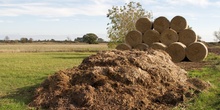Natural Resources & Waste
Our Work
Latest in Natural Resources & Waste
-
How can Planetary Boundaries guide environmental policy in Europe and globally?
Planetary Boundaries are a scientific approach to exploring critical thresholds to resource use. How can this concept become relevant for policymakers?
-
IEEP sets out new sustainability criteria for biofuels post 2020
Defining effective and workable sustainability criteria for biofuels is one of the critical steps in decarbonising Europe’s energy sector. Such criteria must provide the necessary safeguards for the use of bioresources in Europe, as well as the policy and investment certainty required for sustainable deployment.
-
Sustainability criteria for biofuels post 2020
Defining effective and workable sustainability criteria is one of the critical steps in decarbonising Europe’s energy sector. They must provide the necessary safeguards for the use of bioresources in Europe, as well as the policy and investment certainty required for sustainable deployment.
-
Looking beyond Paris
The latest edition of IEEP's newsletter is now available. David Baldock argues that in the next six months the EU has a substantive role in contributing to agreement on an ambitious but credible set of SDGs and more stretching climate targets. Also: energy efficiency and security; bioeconomy; and circular economy.
-
Evidence before ideology
The latest edition of IEEP's newsletter is now available. David Baldock argues that in 2015 solid evidence rather than political fashion will be required in scrutinising EU policy and economic performance. Also: fossil fuel subsidies; allocating fishing quota; and the launch of our new training programme.
-
The Manual: Chapter 6 - Waste
This is a chapter of IEEP’s Manual of European Environmental Policy. This chapter on EU waste policies focuses on the management of waste, the environmental requirements with which waste management installations must comply and the big picture policy initiatives focused on waste.
-
The Manual: Chapter 13 - Sectoral policies
This is a chapter of IEEP’s Manual of European Environmental Policy. This chapter sets out the development of some of the most important links between EU environmental policy and other policy areas, such as agriculture, forestry, fisheries, transport, trade, and so on.
Highlights
-

Sustainability criteria for biofuels post 2020
Defining effective and workable sustainability criteria is one of the critical steps in decarbonising Europe’s energy sector. They must provide the necessary safeguards for the use of bioresources in Europe, as well as the policy and investment certainty required for sustainable deployment.
